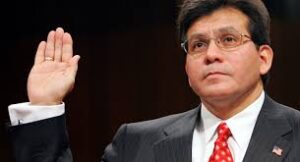In a surprising and impactful political endorsement, former U.S. Attorney General Alberto Gonzales has announced his support for Vice President Kamala Harris. This endorsement, notable for its bipartisan implications, represents a significant moment in the political landscape, reflecting a nuanced alignment of political perspectives and highlighting Harris’s growing influence across party lines.
A High-Profile Endorsement: What It Means
Alberto Gonzales, who served as Attorney General under President George W. Bush, is a prominent figure in American legal and political circles. His endorsement of Kamala Harris, a Democrat and Vice President under President Joe Biden, is an unusual but potent alignment that underscores the complex dynamics of contemporary politics.
Cross-Party Support: Gonzales’s support is striking given his Republican background and Harris’s Democratic affiliation. This cross-party endorsement signals a shift in traditional political boundaries and suggests a recognition of Harris’s leadership qualities beyond partisan divides.
Impact on Harris’s Political Standing: For Harris, the endorsement from a respected Republican figure enhances her credibility and broadens her appeal. It signals that her leadership and policies resonate across political lines, potentially attracting undecided voters and reinforcing her position as a unifying figure in American politics.
Gonzales’s Perspective: Why He Supports Harris
Gonzales’s endorsement is rooted in a complex assessment of Kamala Harris’s performance and leadership. Several key factors appear to influence his support:
Respect for Leadership: Gonzales has publicly acknowledged Harris’s capabilities as a leader and her dedication to public service. His support reflects a recognition of her competence and effectiveness in her role as Vice President.
Shared Values and Goals: Despite party differences, Gonzales and Harris share common goals on several key issues, such as judicial reform and national security. This alignment on important matters may have contributed to Gonzales’s decision to endorse her.
Personal Respect: Gonzales’s support also highlights a personal respect and professional admiration for Harris. Their interactions and professional engagements may have fostered a mutual respect that transcends partisan differences.
Political Ramifications: A Sign of Changing Dynamics
The endorsement of Kamala Harris by Alberto Gonzales has broader implications for American politics:
Bipartisan Cooperation: Gonzales’s support exemplifies the potential for bipartisan cooperation and the breaking down of traditional political barriers. It highlights the possibility of finding common ground and working together across party lines to address national issues.
Public Perception: This endorsement may influence public perception of Harris, presenting her as a leader who can garner respect from figures across the political spectrum. It could enhance her standing among moderate and independent voters who value cross-party support.
Strategic Impact: In the context of upcoming elections and political campaigns, Gonzales’s endorsement could serve as a strategic asset for Harris. It may help her appeal to a broader audience and strengthen her position in future political contests.
Conclusion: A New Era of Political Endorsements
Alberto Gonzales’s endorsement of Kamala Harris is a noteworthy development in the American political arena. It reflects a shift towards more nuanced and cross-party support, challenging traditional political divides and emphasizing the importance of leadership qualities over party affiliation.
As political dynamics continue to evolve, this endorsement serves as a reminder of the potential for collaboration and respect across the political spectrum. For Kamala Harris, Gonzales’s support is both a significant validation of her leadership and a potential catalyst for broader political engagement.
The endorsement also underscores a broader trend towards bipartisan cooperation and the recognition of shared values in addressing the nation’s challenges. It represents a moment of political reflection and adaptation, marking a step towards a more inclusive and collaborative approach to governance.
In this new era of political endorsements, the alignment of figures from different parties highlights the evolving landscape of American politics, where leadership qualities and shared goals may increasingly take precedence over traditional partisan divisions.











